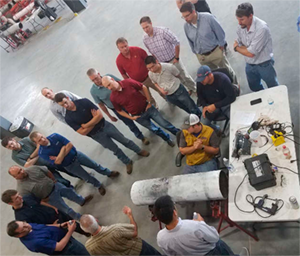API 1163 Verification and Validation Workshop
Led by Dr. Tom Bubenik
OCTOBER 11-12, 2023 | PRCI’s Technology Development Center | Houston
Register before September 27, 2023 and save $200!
| Day 1 |
| 8am-5pm CDT |
Course |
| Day 2 |
| 8am-5pm CDT |
Course |
This course will be held at
PRCI’s Technology Development Center
in Houston.

OVERVIEW
This course is for engineers responsible for verifying and validating in-line inspections (ILI) of pipeline system in accordance with the third edition of API Standard 1163 “In-line Inspection Systems Qualification.” API 1163 provides requirements for qualification of in-line inspection systems used in gas and hazardous liquid pipelines. The second edition of API 1163 is incorporated by reference into PHMSA regulations 49CFR192 and 195, and the third edition is expected to be incorporated after PHMSA’s review of the document.
API 1163, 3rd edition, expands and makes mandatory requirements that pipeline operators both verify and validate ILI performance as part of a pipeline integrity management program:
- Verify: Ensure compliance with appropriate plans, procedures, and processes and that inspection conditions are consistent with those used to establish the performance specification(s) for the inspection system being used. A verified inspection should meet the performance specification(s).
- Validate: Ensure that the reported ILI results are consistent with the performance specification(s). A validated inspection is one that the pipeline operator considers consistent with the performance specification(s) and suitable for use in managing the integrity of a pipeline.
The course will teach students practical techniques for verifying and validating a metal loss ILI in accordance with API 1163, 3rd edition. The course includes and provides instructions on the use of an API 1163, 3rd edition, spreadsheet recently released by PRCI to validate ILI results. Exercises conducted during the course will ensure students understand how to use the software, and they will help students build and maintain the skills needed to successfully apply API 1163, 3rd edition. The skills used for metal loss inspection program can also be applied to crack-detection and other inspections programs.
LEARNING OBJECTIVES
At the completion of this course, students will be able to
- Understand ILI essential variables in API 1163, 3rd edition, and how ILI service provider’s performance specifications are formulated
- Verify that an ILI has been successfully conducted in accordance with API 1163, 3rd edition
- Establish the basis for verifying the inspection before the inspection is conducted
- Evaluate the conditions under which the ILI was conducted to ensure they are consistent with the ILI performance specification
- Review preliminary (field) ILI results regarding data quality and consistency requirements
- Accept the ILI data on site after evaluating and reviewing the ILI conditions and preliminary results.
- Validate ILI accuracies in accordance with API 1163, 3rd edition
- Establish the basis for validating the inspection before the inspection is conducted
- Define the number of field measurements needed to validate the inspection based
- Validate an inspection to API 1163, 3rd edition, Level 1, 2, or 3
- Accept the ILI results after evaluating the ILI results as given in the inspection report and/or data spreadsheet
- Understand the role uncertainty plays in using ILI results
PREREQUISITE KNOWLEDGE
Entering this course, you should have a basic understanding of what in-line inspection (ILI) entails
- How ILI tools are selected, prepared, and used to inspect pipelines for anomalies that could threaten integrity
- How basic inspection technologies work – caliper, MFL, ultrasonic wall thickness, ultrasonic crack detection, and EMATs
- What typical ILI data, reports, and spreadsheets look like
- Field methods of measuring anomalies versus what has been reported by the ILI
COURSE DOCUMENTATION
Complete course presentation material will be available as a PDF download prior to the course.
CONTINUING EDUCATION UNITS
Upon completion of the course, participants will be eligible to receive 1.4 Continuing Education Units.

